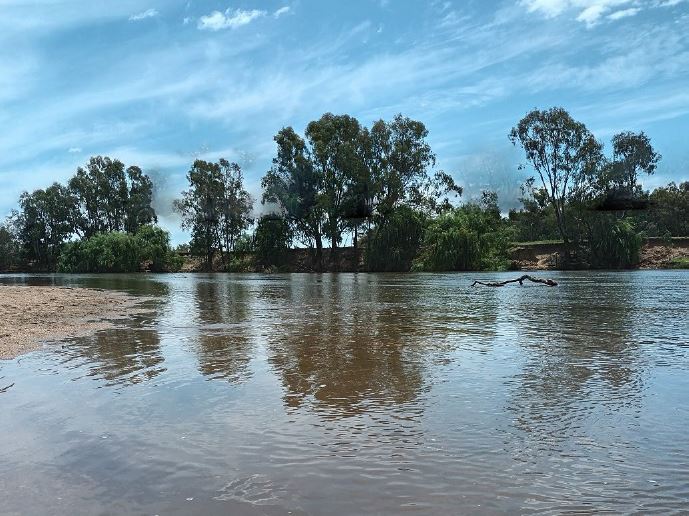Published 2 June 2023
New research exploring First Nations Peoples’ water safety beliefs and practices in Wiradjuri Country has found family is a key source of water safety knowledge, with storytelling being critical to water safety education.
The research, which was commissioned by Royal Life Saving Society – Australia and launched today, features interviews with Wiradjuri people in Wagga Wagga NSW. Wiradjuri Country has three significant rivers: Marrambidya (Murrumbidgee), Galari (Lachlan) and Wambool (Macquarie).
In particular the Murrumbidgee River was the focus of this study given it is one of the top 10 river drowning locations in Australia.
The report was co-authored by School of Population Health, UNSW Sydney academics Jasmine Williams, Dr Amy Peden and Professor Faye McMillan AM (now at UTS). Both Ms Williams and Professor McMillan are proud Wiradjuri Yinaa-galang (women) and Dr Peden grew up on Wiradjuri Country in the central west of NSW.
Six recommendations were generated for improving water safety among First Nations Peoples, specifically relevant to the Wiradjuri people of Wagga Wagga.
Royal Life Saving Society – Australia Chief Executive Officer Justin Scarr said the research would be used to help inform drowning prevention strategies for First Nations communities.
“Reducing drowning among Aboriginal and Torres Strait Islander people and communities has been a priority area in the Australian Water Safety Strategy since its inception in 1998,” Mr Scarr said.
“Royal Life Saving is interested in how different first nations communities see their relationship with water, and water safety.
“We are hoping that this research, and the other projects we are seeding, generates ideas about local approaches to water safety, about how to build on existing community strengths, with the long term objectives of further reducing drowning.”
Lead author Jasmine Williams said she hoped the research would help prevent drowning incidents in the community.
“The community were very engaged and supportive of the research. We are grateful that they were willing to share their experiences and knowledge,” Ms Williams said.
“There is so much we can learn by the power of our communities’ knowledge.
“It was an honour to participate in yarning circles with Yindyamarra (respect) and Ngurrbul (love).”
Royal Life Saving Society – Western Australia Board Member Gningala Yarran-Mark said there needs to be a continued focus on water safety programs and ensure they were accessible to Aboriginal and Torres Strait Islander communities.
“When Aboriginal and Torres Strait Islander communities are consulted and included in the solutions brokering, it empowers communities to be proactive and invested, thus ensuring success of such programs,” Ms Yarran-Mark said.
The four themes identified in the study are:
- Family as the key source of water safety knowledge
- Story telling as an important component of water safety education
- The river as being central to culture, preferred by required respect
- The power of experiential learning
Download the report here.
As part of our Reconciliation Action Plan (RAP), Royal Life Saving is committed to building a strong learning foundation on the principles of relationships, respect and opportunities. We acknowledge the land where we work, live and play always was and always will be Aboriginal land.
The rivers, lakes, pools, billabongs, and dams in Australia bring life to communities. They are spaces for play, social connection, and recreation. They can also be spaces of danger and tragedy.
We recognise that water safety awareness and enjoyment of our waterways is a collective responsibility. We can all play a part.
We thank the report co-authors and the participants of this research for their time and contributions to water safety knowledge and drowning prevention actions.
We look forward to continuing this collaboration and building these recommendations into our actions and programs.

